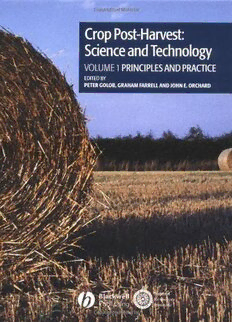
Crop Post-Harvest: Science and Technology, Volume1: Principles and Practice PDF
578 Pages·2002·8.96 MB·English
Most books are stored in the elastic cloud where traffic is expensive. For this reason, we have a limit on daily download.
Preview Crop Post-Harvest: Science and Technology, Volume1: Principles and Practice
Description:
World-wide losses of crops, post-harvest, through microbial action, pests, diseases and other types of spoilage amount to millions of tons every year. This essential handbook is the first in a three-volume series which covers all factors affecting post-harvest quality of all major fruits, vegetables, cereals and other crops. Compiled by members of the world-renowned Natural Resources Institute at the University of Greenwich, Chatham, UK, the comprehensive contents of this landmark publication encourage interactions between each sector of the agricultural community in order to improve food security, food safety and food quality in today’s global atmosphere. Through the carefully compiled and edited chapters, internationally respected authors discuss ways to improve harvest yield and quality, drawing on their many years’ practical experience and the latest research findings, applications and methodologies. Subjects covered include: an introduction to the systems used in post-harvest agricultural processes, physical and biological factors affecting post-harvest commodities, storage issues, pest management, food processing and preservation, food systems, the latest research and assimilation of this work, and current trade and international agreements. An invaluable glossary showing important pests, pathogens and plants is also included.Crop Post-Harvest: Science and Technology Volume 1: Principles and Practice is a must-have reference book which offers the reader an overview of the globalisation of post-harvest science, technology, economics, and the development of the storage and handling of perishable and durable products. Volumes 2 and 3 will go on to explore durables and perishables individually in more detail, with many case studies taken from around the globe. This 3-volume work is the standard handbook and reference for all professionals involved in the harvesting, shipping, storage and processing of crops, including agricultural and plant scientists, food scientists and technologists, microbiologists, plant pathologists, entomologists and all post harvest, shipping and storage consultants. Libraries in all universities and research establishments where these subjects are studied and taught should have multiple copies on their shelves
See more
The list of books you might like
Most books are stored in the elastic cloud where traffic is expensive. For this reason, we have a limit on daily download.
